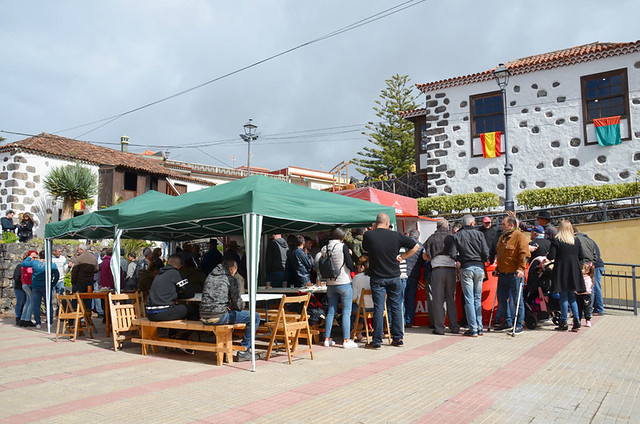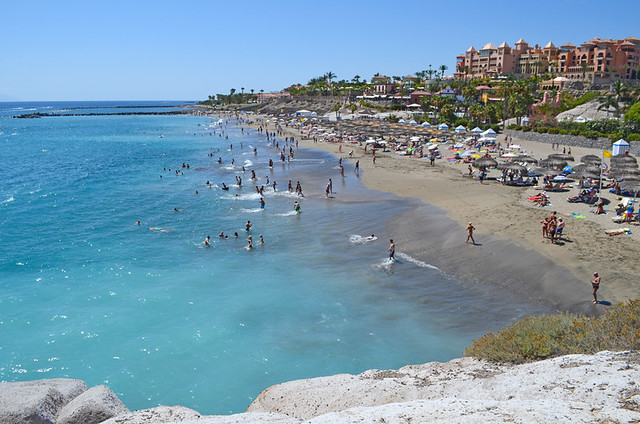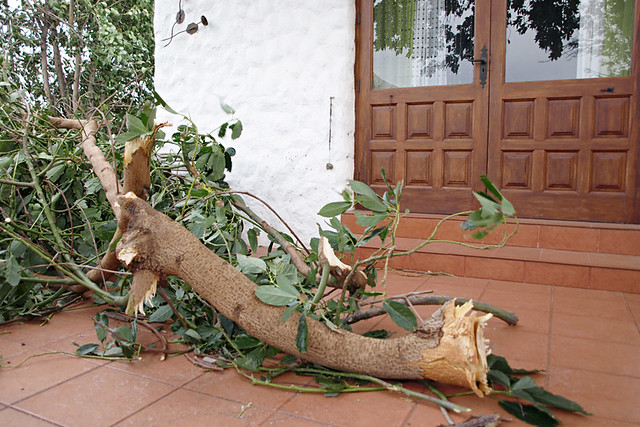This is how the discussion went:
“Let’s give up everything and move to Totnes.”
“Why not go the whole nine yards and move abroad… somewhere like Sri Lanka.”
And then we ended up in the destination at the end of many discerning travellers’ noses – Tenerife.
That’s obviously an abridged version of events, but things did pan out that way.

Tenerife turned out to be a revelation, far more ‘foreign’ than expected; than any number of UK travel articles, TV programmes had led us to believe. The blend of being a popular mass tourism destination as well as turning out to be a location where tradition and culture was fervently observed meant living and working there was an ongoing education, one which we believe laid an invaluable foundation for living and working anywhere.
We could fill a book with wonderful, quirky and occasionally highly irritating or deeply stressful experiences, in fact Andy is doing just that. But for now, these are ten tapas-sized portions of some of the things living and working in Tenerife taught us.
Speaking another language
Apart from diluting our personalities to that of the average amoeba, stuttering along with the few words and phrases we’d learned at night school in Manchester made us feel stupid, because we were linguistically backward. However, the biggest barrier to communicating was the fear of getting it wrong. It took a few years to eradicate that and realise ‘getting it over the net’ was more important than not trying because of a fear of getting it wrong. People appreciate the effort… unless you’re in France. After we conquered the embarrassment factor, communicating with others became far easier and more fruitful. Whereas once I would have walked on by, these days, in any destination and without any qualms at all, I’ll happily enter a quirky looking bar full of folk whose language I can’t speak.

Bureaucracy and essentials for living
The act of everyday living seems to take longer in other countries than it did in Britain. Bureaucracy especially eats up large chunks of time. Something Andy read in another travel article summed up why bureaucracy can hog so much time when people move abroad. In your home country you rack up various milestones gradually as you grow up – being registered on official systems, with the doctor and dentist, opening a bank account, getting a National Insurance number etc. When you move abroad you have to do all these things and more within a limited period. The European Commission website states “As an EU national you are entitled to take up work or look for a job in another EU country.” But moving between EU countries isn’t as seamless a process as it could or should be.
Working practices
I have differing views toward the EU from some folk whose political ideology I mostly share. Part of that has to do with working conditions/practices I’ve witnessed where barely adhered to EU legislation is the only flimsy barrier preventing employers, and governments, from completely screwing their employees/citizens. And even then, quoting EU legislation could be met with a shrug. When it comes to the self-employed, crippling tax systems have created a huge black economy which few people talk about. Taxation laws which hammer small businesses are imposed by the governments of individual countries, nobody else. Learning first hand the consequences of Spain’s helped me understand how similarly flawed systems in other countries (e.g. Greece, Italy) contributed massively to their domestic economic problems. Actual experience is quite different from theoretical viewing from a distance.

Politics and cultural differences
In the West Wing TV series there was an eccentric British character, Lord John Marbury, who President Bartlet (Martin Sheen) relied on for helping him understand cultural nuances when dealing with non-US conflicts. Watching his scenes again after living in Tenerife for a few years, made me realise just how insightful they were. There are any number of examples I could give, many positive others negative, but one which helped me understand how important and revealing it is to view situations from another person’s ‘hilltop’ relates to how corruption is perceived. There were regular press reports about local politicians being charged with corrupt practices – giving jobs to friends and family members, awarding contracts to ‘friendly companies without following due process etc. Often these politicians would be outraged at the accusations. We’ve witnessed this ourselves and were gobsmacked at how perpetrators could try to defend what were clearly open and shut cases. The answer was they genuinely didn’t view their actions as being corrupt. They were doing things the way they’ve always been done. Times and legislation had changed but their practices hadn’t. Once you tune into being aware there are cultural differences of a political nature you can spot similar patterns everywhere. You can apply the same in other countries (including Britain) to racism, antisemitism, homophobia, xenophobia… many things.

Travellers’ attitudes
The first time I realised there were various degrees of travel snobbery, even when it came to popular package holiday travel destinations, was before we moved. On hearing we were relocating to Tenerife a work colleague told me how jealous she was as she took holidays there regularly but “not in Playa de las Américas. We go to the posh part, Costa Adeje.” Over the years we experienced multi-levels of this sort of thinking, some of it on a ridiculous level. Once we overheard an English woman on the phone telling another she was going to have to visit tourist land that afternoon. She was referring to Costa Adeje. The irony was she was making the phone call from a purpose-built resort in the south west of Tenerife where she lived. In work terms, as travel writers, being aware of this traveller hierarchy has proved invaluable in understanding travel preferences on a wider scale. A small example of this applies to strategies for using social media. If we just wanted big numbers of followers we’d post images of dreamy beaches all the time on our Tenerife facebook page. But we don’t, we want to be read by the sort of people who enjoy the same things as us… which does happen to include beaches. But just not exclusively.

The travel writing business
We never planned to take up travel writing as an occupation when we moved, but a fortunate series of events pushed us in that direction. We built up a multi-faceted knowledge of the island which subsequently showed us what was being written in UK media about Tenerife at that time was generally superficial and one-dimensional. It helped us learn how travel writing and travel writers worked, as well as just how much tourist boards often influenced what appeared in travel articles. When you specialise in a single destination, especially one as popular as Tenerife, you see lots of trends emerging – the same themes, restaurants, hotels, attractions etc. pushed time and time again in travel articles. You note which writers/bloggers invest time in trying to be original and which ones rehash the obvious with little research or thought. You learn which editors actually want originality and which ones just want to fill pages. Basically, over time it gave us an invaluable insight into the good, the bad, and the ugly of the travel writing business.

Back to basics living
The last two places in Portugal we’ve stayed for any length of time, water has been pumped from a borehole. If the electricity cuts, there’s no water. On Tenerife that wasn’t the case, but the water pipe which connected our supply to the mains, about two hundred metres away, was our responsibility. We never encountered any problems, but our neighbour’s plastic pipe, which ran across the top of a wall between us and a banana plantation, was always bursting, showering our garden (a bonus for us), costing her in water bills and repairs. There was no central heating or piped gas, so keeping a supply of chopped logs was essential for heating on cool winter nights. Bottles of butano, which had to be lugged a couple of hundred metres from the car park to the house, kept us supplied with hot water and gas for cooking. I’m not a proficient handyman but a more back-to-basics way of living meant I had to learn a range of DIY – like replacing the chimney when a storm destroyed it, or changing the flush system in the toilet when it broke, as well as dealing with attacks of woodworm, figuring out problems with the electricity after it tripped whenever it rained, and so on. It’s exactly the same in Portugal, people around us carry out their own repairs, using items until the literally fall apart. It’s a simpler way of life which teaches us a lot… and it’s a refreshing antidote to the excesses of materialism we witness when we return to the UK.

News and the press
Reading international news in the papers of another country can give a quite different perspective on current affairs, and helps you look at the world from contrasting angles. A controversial news story shortly after we moved to Tenerife was illuminating about the UK press and how ‘news’ could be controlled. It involved a member of the British monarchy. It was so controversial the UK media were prohibited from reporting it. But the international press weren’t, so we were able to read what people in the UK couldn’t. For the period of the story, no international newspapers were available in Britain’s newsagents. Additionally, some news stories about events abroad are out of date by the time people in the UK read about them. And they are often reported in a misleading or completely inaccurate way. This happened many times with stories concerning Tenerife – often related to forest fires or volcanic activity (usually seriously exaggerated). If it happens with Tenerife, it happens elsewhere. The likes of Twitter can be far better than the mainstream media in the UK for following actual newsworthy events in other countries, but only from reputable sources.

Weather
And then there’s the weather, one of the many big pay-offs when it comes to living in a country in southern parts. Life is mostly lived outside, and cold is never really that cold… except inside the house because there’s no central heating. I have no doubt living in a temperate climate makes people more amenable, generally. But Tenerife taught us there’s a Mr Hyde side to living in warm climates – extremes. Hot weather and devastating, deadly forest fires go hand in hand. A subtropical climate means destructive, subtropical storms. Especially when living in rural areas, these seem especially threatening. The reality of living where the weather is warm to temperate all year round more than matches the dream. But for short periods, when it throws a tizzy, it can be far, far more frightening than anything we ever encountered in Britain. Subsequently we’ve developed a healthier respect for the weather, and are happy to see certain key points of the year pass without incident.

Community is everything
Possibly the biggest single lesson we’ve learned (re-learned) is the importance of community. In traditional Tenerife it is rock solid – everybody knows everybody else and subsequently places with a strong sense of community feel safer, and friendlier. Centuries-old traditions act like a glue which bonds neighbourhoods and even towns together. Children are indoctrinated into these traditions at an early age, ensuring they continue when the reigns are handed over to the next generation. One of the things which cemented our decision to move to Puerto de la Cruz in the first place was the nostalgically warm atmosphere in Plaza del Charco, where families gather at weekends and for cultural events and fiestas. The sense of community was/is almost tangible. It’s a happy place. Now we recognise it in other locations we visit… and note its absence where it doesn’t exist.
Wherever we temporarily lay our hats, that sense of community has to figure highly on the ‘must have’ list.




Be the first to comment